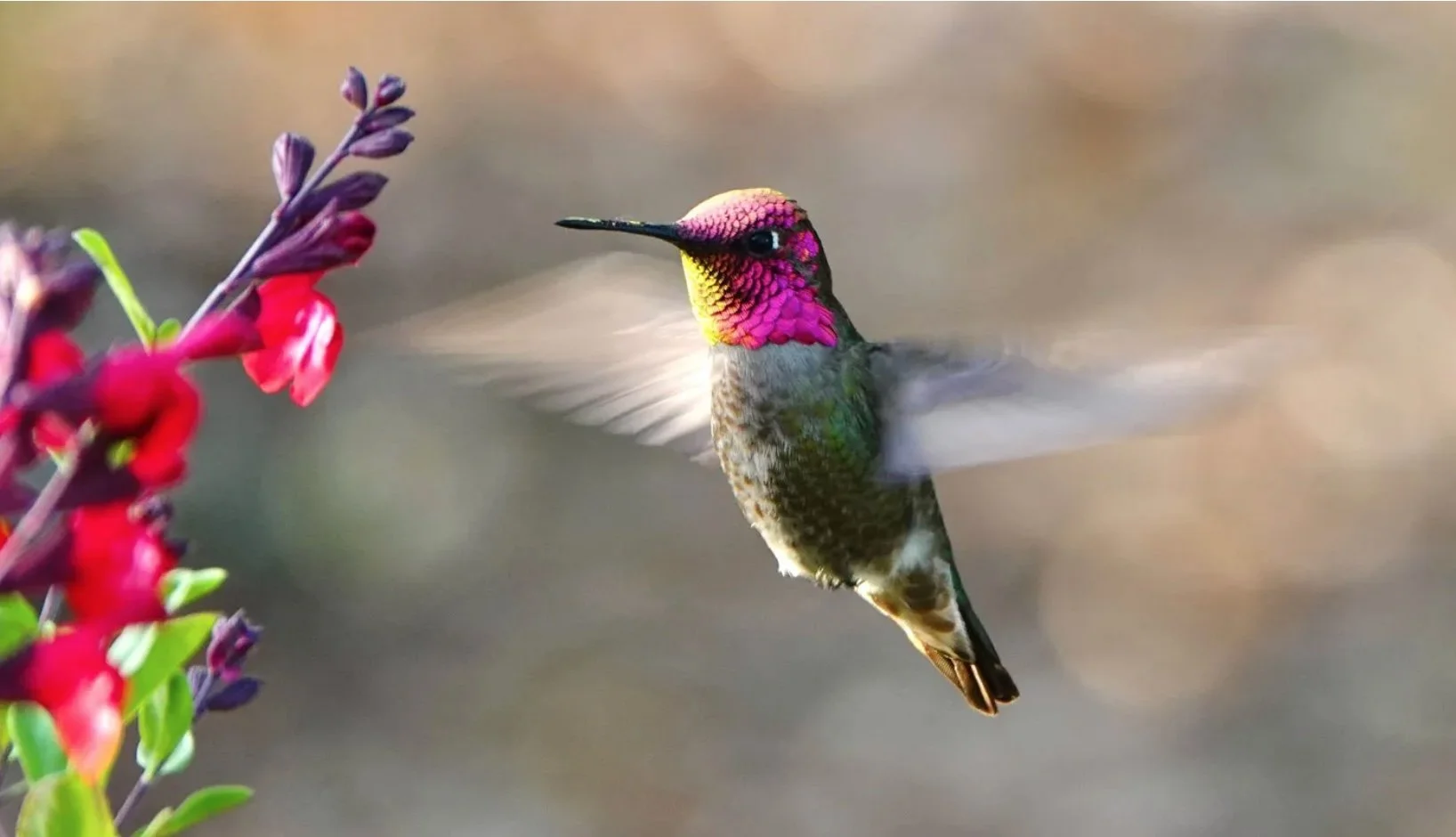By The Landlord
“There are vast realms of consciousness still undreamed of – vast ranges of experience, like humming of unseen harps, we know nothing of, within us.” – DH Lawrence
“To write a book is for all the world like humming a song – be but in tune with yourself, madam, 'tis no matter how high or how low you take it.” – Laurence Sterne
“There is geometry in the humming of the strings, there is music in the spacing of the spheres.” – Pythagoras
“ … hummings and clickings could be heard-the sounds attendant to the flow of electrons, now augmenting one maze of electromagnetic crises to a condition that was translatable from electrical qualities and quantities to a high grade of truth.” – Kurt Vonnegut
“Quick as a hummingbird... she darts so eagerly, swiftly, sweetly dipping into the flowers of my heart.” – James Oppenheim
“When she is alone in the rooms I hear her humming to keep herself from thinking.” – Jean-Paul Sartre
“Marvin was humming ironically because he hated humans so much.” – Douglas Adams
“But you make me sing like a guitar humming …” – Neil Diamond
“Bebop was like humming along to Mitch Miller to me." – Albert Ayler
“My own brain is to me the most unaccountable of machinery - always buzzing, humming, soaring roaring diving, and then buried in mud. And why? What's this passion for?” – Virginia Woolf
“I find humming is very useful …” – Elvis Costello
“To us, love says humming that the heart's stalled motor has begun working again.” – Vladimir Mayakovsky
Hmm, but also, – Mmm. It's a simple, muted, closed-mouth, wordless, monotone vocal sound that emanates from the nose, and varies in pitch and volume, also the resonance of air in various parts of the head and throat in the act of breathing, but humming is far more complex in its associations and emotions. A perfect warm-up technique for the singing voice, it's also a low-volume cradle of creativity, the early emergence in the creation of a song, or a wider idea. It's the free-form sound of thought, of our brains all a-whir.
Humming sounds can have a broad set of mood and contexts, from the beautiful hovering of a hummingbird, sounds from the fast beating of wings, to the low fan sound of our computers running (or of Douglas Adams’ sarcastic robot), or electricity mains, perhaps of a microwave. It could be a person happily passing the time sotto voce while doing a task, humming tunes. It could be the sound of indecision. Perhaps it’s the low murmur of crowds, happy, or ill at ease, and in darker tones, the terrible sound of the Second World War V-1, buzz bomb or doodlebug, which, when it stops, is prelude to a possible deadly explosion. A hum, just like a human, can mean many things.
So this week it's a hum-dinger, or at least a hum-singer of a topic, one in which we're seeking songs that feature that sound, perhaps mostly by the vocalist when not singing lyrics, but perhaps other effect and forms of vibrating hum. It occurs in rock and pop, famous classical operatic passages, jazz, R&B, reggae and much more. Sometimes it’s perhaps because the songwriter didn’t find the right words, but when used most effectively, humming can simply be catchy, but hopefully also captures something more universal and primal.
Last week's delightfully fun topic was all about chickens and poultry. It is thought that the low-level clucking sound made when they are going about their everyday business such as foraging, feeding, is their version of humming, designed to give out a sense of calm to others in the flock. It is only when they suddenly stop that it is a warning to scan for potential danger. Charles Darwin remarked something similar for horses and cattle, and Australian musicologist Joseph Jordania has remarked that as social animals, humans also associate humming with a state of calm and relaxation. It's a deep-seated element of our language development.
Pirahã is one of the oldest and last surviving dialects of the Amazonian Mura language, in which there is a special register of speech which uses solely humming. In this clip, a mother talks to her child with a series of subtle, gentle, lullaby-like hummed-words:
American singer Gregory Porter also describes humming in his upbringing as a different kind of calm: "My grandmother and my mother and my grandfather, their style of praying was - all day long, they would pray by singing and humming."
But in Jeffrey Eugenides' acclaimed novel Middlesex, by contrast, the indistinctness of the humming sound summons less comforting moods: "The humming of my parents' voices from behind my bedroom wall, which throughout my childhood had filled me with a sense of security, had now become a source of anxiety and panic."
And in Herman Melville's classic, Moby Dick, Captain Ahab is left in disturbed state by the quiet seas, knowing that the large cetacean of his obsession is still out there somewhere, but it is that humming of his own mind that keeps him on edge:
"The stillness of the calm is awful. His voice begins to grow strange and portentous. He feels it in him like something swallowed too big for the esophagus. It keeps up a sort of involuntary interior humming in him, like a live beetle. His cranium is a dome full of reverberations. The hollows of his very bones are as whispering galleries. He is afraid to speak loud, lest he be stunned; like the man in the bass drum."
And here's Alfred Lord Tennyson, contrasting the solitude and calm of the bucolic, with the mixed emotions and distant hum of the busy city:
Not wholly in the busy world, nor quite
Beyond it, blooms the garden that I love.
News from the humming city comes to it
It sound of funeral or of marriage bells.
HG Wells later captures a changing world with the advent of the age of the aeroplane:
"As the journalists of the time phased it, this was the epoch of the Leap into the Air. The new atomic aeroplane became indeed a mania; everyone of means was frantic to possess a thing so controllable, so secure and so free from the dust and danger of the road, and in France in the year 1943 thirty thousand of these new aeroplanes were manufactured and licensed, and soared humming softly into the sky."
Darker hums …
The 20th century saw a whole lot of new humming to human ears, but here's American poet Billy Collins, born during that war, in 1941, capturing sound of authors' thoughts on a bigger scale:
I can hear the library humming in the night,
a choir of authors murmuring inside their books
along the unlit, alphabetical shelves,
Giovanni Pontano next to Pope, Dumas next to his son,
each one stitched into his own private coat,
together forming a low, gigantic chord of language.
Humming tunes? Best-selling American novelist Barbara Kingsolver meanwhile captures a different perspective on humming: "In the long run, most of us spend about fifteen minutes total in the entanglements of passion, and the rest of our days looking back on it, humming the tune."
And here's a more sinister take on the sound in a ghostly figure described by William S. Burroughs:
"I know this one pusher walks around humming a tune and everybody he passes takes it up. He is so grey and spectral and anonymous they don't see him and think it is their own mind humming the tune."
The human-weary ironic humming Marvin the paranoid android
Naturally there's a gang of musicians arriving at the Bar this week to have their own humming moment. For some, it's a perfect sort of warm-up to a performance. Top-quality crooner Engelbert Humperdinck gives us a vivid picture of his pre-gig routine:
"I always take a hot shower before I go onstage. It's so refreshing. I let the steam into my throat. That's the way I warm up my vocal cords - in the shower. I start by humming and then finally singing."
Nikki Sixx meanwhile reckons that humming is a truly uplifting form of non-language communication at a live event: "Sometimes when people can't speak English, they hum the melody instead of singing along. Having 20,000 people humming your song is incredible."
But what of humming for the craft of songwriting? In the The Beatles Get Back documentary footage, it's fascinating to see Paul McCartney's gradual formation of that song in a process of strumming, humming and half-formed words.
No matter whether you're one of the greats or less so, it seems to be universal method. Here's American singer-songwriter Kina Grannis explaining that she doesn't try, the formula always seems to work:
"If I try to write a song, I will completely fail to write a song. But if I'm just holding my guitar and I just start humming, then I'll have a song in an hour."
Pakistani-American singer Nadia Ali says that "personal relationships are usually my biggest inspirations for writing my songs. But the best way for me to write a song is to visualise the story in my head, and I start humming a melody, and before you know it, a song is born."
And here's Jack Johnson, describing that slow-evolving process:
"Sometimes I just start humming something, find a melody I like a lot, and if it sticks around for a couple days, a few words will lock themselves into place. I might just get the first line. Then words just keep falling into the syllables. The choruses kind of write themselves and verses I have to work at a little bit."
Canada’s Kiesza seems to be at it constantly, even on public transport:
"When I'm on a plane, I am the annoying person humming into my phone. Sitting there static with nothing to do, a lot of melodies come to me. So I've written a lot of songs on planes."
But finally, let's hear a humorous take from Daniel Handler, aka Lemony Snicket, author of the hit childrens' book sequence A Series of Unfortunate Events, describing very much how not to create music:
“‘Composer’ is a word which here means ‘a person who sits in a room, muttering and humming and figuring out what notes the orchestra is going to play.’ This is called composing. But last night, the Composer was not muttering. He was not humming. He was not moving, or even breathing. This is called decomposing.”
Hopefully then we're not decomposing, but there's a real buzz and hum of ideas for this topic. Might you even pull out a kazoo? That's up to you. Humming and harring over eventual playlists as well as humming along to your tunes is the perceptive ears of ParaMhor! Deadline is 11pm on Monday UK time, for playlists published next week. A hum-dinger indeed.
Kazoo? Up to you …
New to comment? It is quick and easy. You just need to login to Disqus once. All is explained in About/FAQs ...
Fancy a turn behind the pumps at The Song Bar? Care to choose a playlist from songs nominated and write something about it? Then feel free to contact The Song Bar here, or try the usual email address. Also please follow us social media: Song Bar Twitter, Song Bar Facebook. Song Bar YouTube, and Song Bar Instagram. Please subscribe, follow and share.
Song Bar is non-profit and is simply about sharing great music. We don’t do clickbait or advertisements. Please make any donation to help keep the Bar running:




